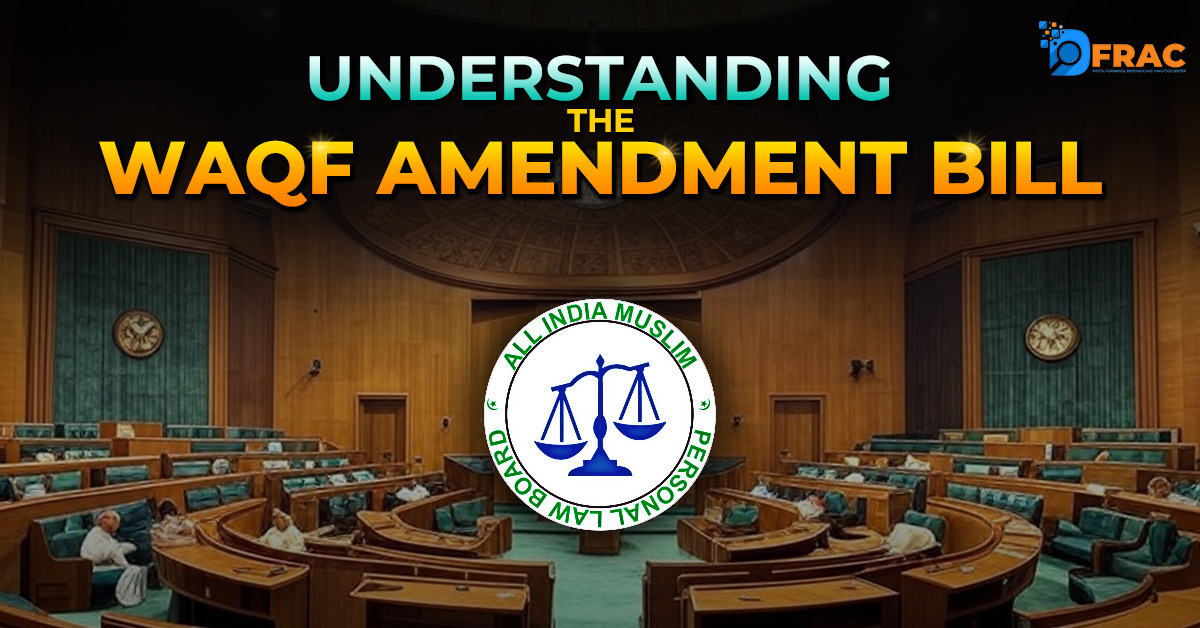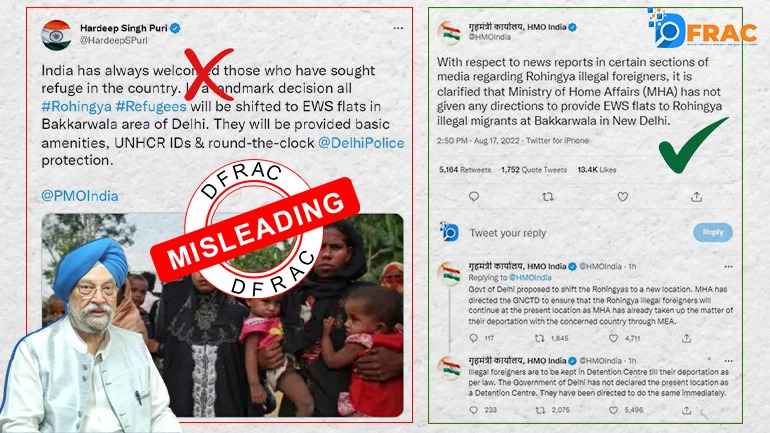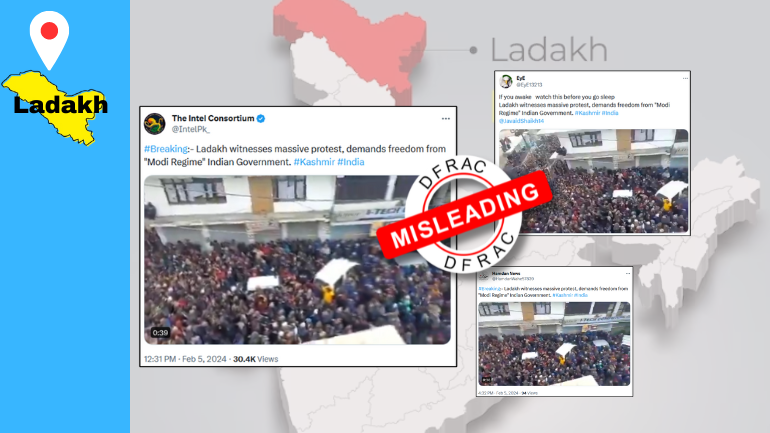The report examines the multifaceted landscape surrounding the Waqf Amendment Bill. It opens with an explainer that clarifies common myths and key provisions of the bill, emphasizing that legitimate waqf properties remain protected and that the legislative changes aim to improve transparency and administrative efficiency. Additionally, the report delves into the digital sphere showing how hashtags associated with the bill have trended on social media. By combining traditional legislative insights with real-time social media data, the report provides a comprehensive overview of both policy impact and public sentiment.
Myth 1: Will Waqf properties be revoked?
- Fact: No property that is legitimately declared as waqf will be revoked.
- Explanation:
- Once a property is declared waqf, it is meant to stay that way permanently.The bill only clarifies rules for better management and transparency.It allows the District Collector to review properties that might be misclassified as waqf, especially if they are government property.
- Legitimate waqf properties remain protected.
Myth 2: Will there be no survey of Waqf properties?
- Fact: There will be a survey.
- Explanation:
- The bill replaces the old role of the Survey Commissioner with the District Collector.
- The District Collector will conduct surveys using existing revenue procedures.
- This change aims to improve records’ accuracy without stopping the survey process.

Myth 3: Will non-Muslims become the majority on Waqf Boards?
- Fact: No, the boards will include non-Muslims, but they will not form a majority.
- Explanation:
- The bill requires that at least two members of the Central Waqf Council and state boards be non-Muslims, although the majority of members will still be from the Muslim community.
- This change is meant to add expertise and promote transparency without undermining community representation.

Myth 4: Will Muslims’ personal land be acquired under the new amendment?
- Fact: No personal land will be acquired.
- Explanation:
- The bill applies only to properties that are declared waqf.
- It does not affect private or personal property that has not been donated as waqf.
- Only assets voluntarily and legally dedicated as waqf are covered by the new rules.
Myth 5: Will the government use this bill to take over waqf properties?
- Fact: The bill empowers the District Collector to review and verify if a property has been wrongly classified as waqf—especially if it might be government property—but it does not authorize the seizure of legitimately declared waqf properties.

Myth 6: Does the bill allow non-Muslims to control or manage the wealth of the Muslim community?
- Fact: While the amendment mandates that at least two members on the Central Waqf Council and State Boards be non-Muslim, these members are added to bring in additional expertise and oversight. The majority of members remain from the Muslim community, thereby preserving community control over religious affairs.
Myth 7: Will the traditional status of historic waqf sites (such as mosques, dargahs, and graveyards) be affected?
Fact: The bill does not interfere with the religious or historical character of waqf properties. It aims to enhance administrative transparency and curb fraudulent claims—not to alter the sacred nature of these sites.

In simple terms, this clause means that if someone who is not a Muslim donates any property—whether it’s land, a building, or any movable item—to support a waqf (like a mosque, a prayer ground, a shrine, a graveyard, or a community center), then that property automatically becomes part of that waqf. It will be managed and handled in the same way as other property that has been donated as a waqf.
Myth 8: Does the removal of the ‘waqf by user’ provision mean that long-established traditions will be lost?
- Fact: The removal of this provision is designed to prevent unauthorized or erroneous claims over property. It streamlines the registration process by ensuring that only properties formally declared as waqf are recognized—thereby reducing disputes while still respecting traditional waqf declarations.
“Waqf by user” refers to a situation where a property is treated as a waqf simply because it has been used for religious or charitable purposes over a long period—even if there hasn’t been a formal, legal declaration by the owner.
Myth 9: Is the bill intended to interfere with the community’s right to manage its own religious affairs?
Fact: The primary goal of the bill is to improve record-keeping, reduce mismanagement, and ensure accountability. It does not take away the Muslim community’s right to administer its own religious endowments; rather, it introduces a framework to ensure these properties are managed transparently and efficiently.
Aside from these myths, there are several essential aspects covered in the bill that should be considered for greater clarity and to avoid falling for misinformation.
How has the definition of Waqf changed from 1923 to 2013?
The main change in definition was made in 2013 when the expression ‘permanent dedication by a person professing Islam‘ was replaced by ‘permanent dedication by any person.’ After this amendment, it is believed waqf has opened the floodgates for the dedication of property to waqf boards by any person.
Source: Economic Times
Separate Waqf Boards for Dawoodi Bohra and Aghakhani Communities
Recognizing the distinct religious practices of the Dawoodi Bohra and Aghakhani communities (minority Shia Muslim groups), the amendment proposes separate Waqf Boards for these groups who have a distinct set of doctrines and practices. This addresses the need for tailored governance structures to ensure that their waqf properties are managed in alignment with their customs.
Expansion of State Waqf Board Composition
The amendment ensures broader representation from Shia, Sunni, Bohra, Aghakhani, and backward Muslim communities in State Waqf Boards. It mandates that at least one member each must come from the Shia, Sunni, and backward Muslim communities. This aims to reflect the diverse demographics of the Muslim population, ensuring inclusivity in waqf property management.
Critics:
Several stakeholders, including MPs and organizations like the All-India Muslim Personal Law Board, Jamiat-e-Ulema-e-Hind, and Jamaat-e-Islami Hind, have strongly opposed the bill, arguing that it violates constitutional provisions such as Articles 14, 15, 25, 26, and 300A of the Constitution of India, which encompass equality, non-discrimination, religious freedom, and property rights.
One of the most controversial aspects is the shift from elected Waqf Board members to government-appointed nominees, which opponents claim reduces Muslim representation and gives the government excessive control over waqf assets. While the government argues that removing the ‘Waqf by User’ provision will prevent unauthorized claims, critics contend that it weakens protections for waqf properties that have historically been recognized under this category.
The Telangana Waqf Board has been one of the most vocal opponents, arguing that the bill undermines the autonomy of waqf institutions and allows excessive government intervention. Similarly, the Kerala and Uttar Pradesh Waqf Boards have raised concerns about the inclusion of non-Muslims in waqf management, stating that this contradicts established religious and legal precedents.
Political Maneuvering and Protests:
Jamiat Ulema e Hind, a premier organisation of Deobandi theological leaning, and Jamat E Islami have been at the forefront of advocacy against the new waqf bill and preservation of the waqf properties. It is not merely hypocrisy, but an astute move by the Jamiat & Jamat to lay claim to a rich treasure of properties that people and organizations affiliated to it have been in possession of. Even people manning most of the waqf boards in India have been connected to the Jamiat & Jamat. They were availing waqf benefits in the British period and continued to reap this easy yield through their shenanigans after Independence too. Their evil grip on waqf must be loosened to restore the welfare of the poor for whom the waqf is ultimately meant. Besides, as said earlier, the waqf is a matter of faith and practice for the Sufi, Barelwi, and Shia Muslims. They have maintained syncretic traditions of India and the shrines maintained by them have been benefactors of all, especially the poor, irrespective of any creed, and thus the waqf must be restored to these true guardians of India’s syncretic values and patrons of the poor.
Mechanisms to curb corruption and improve efficiency:
- Waqf Boards must submit periodic reports on their activities and financial transactions.
- The finality of tribunal decisions has been removed, allowing appeals in High Courts for greater judicial scrutiny
- Provides a safeguard against potential misjudgments, thereby strengthening the legal oversight of waqf property disputes.
- Financial audits and transparent accounting practices will be enforced to curb fund misuse.
By requiring documentary proof for waqf claims, the legislation aims to prevent disputes over land ownership and protect both private and public lands from wrongful claims.
Statistical Data on Social Media Trends
Our analysis tracked the digital conversation across multiple hashtags to capture the full spectrum of public sentiment around the bill. We examined #WaqfAmendmentBill and #Waqfbill, which highlighted the official discourse and mainstream engagement, while #ChaloJantarMantar reflected grassroots mobilization and local dialogue. At the same time, #RejectWaqfAmendmentBill emerged as a powerful counter-narrative, indicating strong opposition voices. By analyzing tweet timelines, frequency, user activity, and engagement metrics, we decoded the digital pulse and uncovered how these hashtags collectively shaped the online narrative around the bill.
#WaqfAmendmentBill
We analyzed a timeline graph showing tweet frequencies, which revealed distinct peaks that correspond to key events.
The below timeline graph indicates the timeline of the tweets throughout the period. The highs and lows indicates the frequency of tweets. The peaks in the graph indicates the high number of tweets done on that particular period.

Accounts Majorly Tweeted
The below indicates the X accounts who have tweeted on the topic the most. The more the height of the bar, the more the account has tweeted on the topic.

Hashtags Used in the Tweets
The below graph represents the hashtags which were mostly used in the tweets. The more the height of the point, the more the hashtag is used in the tweets.

#ChaloJantarMantar



#RejectWaqfAmendmentBill:



From our data analysis, we observed a significant spike in hashtag activity on Twitter on March 16, with a gradual rise starting from March 14, peaking on March 16, and tapering off after March 18. This surge aligns with the protest organized by the All India Muslim Personal Law Board and other associated Muslim organizations at Jantar Mantar on March 17. The peak in hashtag activity on March 16 suggests a strategic effort to amplify awareness and mobilize support a day ahead of the planned march and protest.
In Summary
- Waqf properties remain irrevocable.
- Surveys will continue, now done by the District Collector.
- Non-Muslim members will be included but not in the majority.
- Only waqf properties are affected—not personal land.
The Waqf Amendment Bill, our investigation reveals, is a study in contrasts. While proponents emphasize its potential to solidify waqf property protections and enhance administrative transparency, critics express deep reservations about the shift in authority towards government appointees, fearing a dilution of community representation.
Simultaneously, a potent digital narrative unfolded, evidenced by the surge of hashtags like #WaqfAmendmentBill, #Waqfbill, and #ChaloJantarMantar, which amplified public mobilization ahead of March’s demonstrations. Conversely, #RejectWaqfAmendmentBill captured the intensity of opposition voices. This convergence of on-the-ground protest and online activism emphasizes the intriguing public discourse surrounding the bill, highlighting both the demand for reform and the persistent anxieties fueling dissent.
References:
Official PIB explainer on the bill
Joint Parliamentary Committee (JPC) Report on the Waqf (Amendment) Bill, 2024





